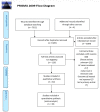Micronutrient Status in Adult Crohn's Disease during Clinical Remission: A Systematic Review
- PMID: 38004171
- PMCID: PMC10674454
- DOI: 10.3390/nu15224777
Micronutrient Status in Adult Crohn's Disease during Clinical Remission: A Systematic Review
Abstract
Adults with Crohn's disease (CD) may be at risk of micronutrient insufficiency in clinical remission through restrictive eating, malabsorption, abnormal losses or inflammation. This systematic review synthesises the literature on micronutrient insufficiency in CD in clinical remission in terms of the prevalence of low circulating micronutrient concentrations and as a comparison against a healthy control (HC). Studies were included if the population was predominantly in remission. A total of 42 studies met the inclusion criteria; 12 were rated as low quality, leaving 30 studies covering 21 micronutrients of medium/high quality that were included in the synthesis. Vitamins D and B12 were the most frequently reported nutrients (8 and 11); there were few eligible studies for the remaining micronutrients. The prevalence studies were consistent in reporting individuals with low Vitamins A, B6, B12 and C, β-carotene, D, Magnesium, Selenium and Zinc. The comparator studies were inconsistent in finding differences with CD populations; Vitamin D, the most reported nutrient, was only lower than the HC in one-quarter of the studies. Adult CD populations are likely to contain individuals with low levels of one or more micronutrients, with the most substantial evidence for Vitamins D and B12. The studies on other micronutrients are of insufficient number, standardisation and quality to inform practice.
Keywords: Crohn’s disease; inflammatory bowel diseases; micronutrient deficiency; micronutrient insufficiency; micronutrients; minerals; review; trace elements; vitamin.
Conflict of interest statement
M.M., C.W., and V.K. are supported by an investigator-led collaborative research agreement with Nestlé Health Sciences. M.M., C.W., V.K., and S.S. have received support for conference attendance from Nestlé Health Sciences. C.W. has received speaker fees from Nestlé Health Sciences. Nestlé had no role in the design of the study; in the collection, analyses, or interpretation of data; in the writing of the manuscript; or in the decision to publish the results.
Figures
References
Publication types
MeSH terms
Substances
Grants and funding
LinkOut - more resources
Full Text Sources
Medical
Miscellaneous


